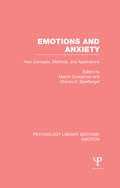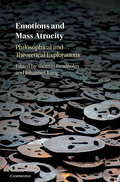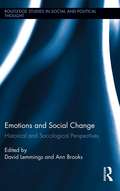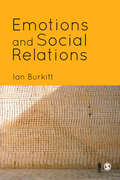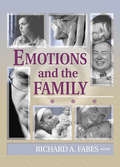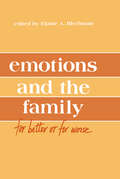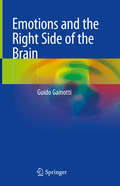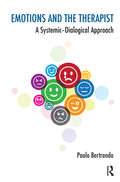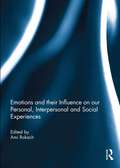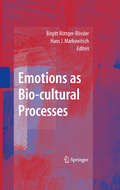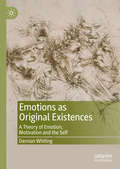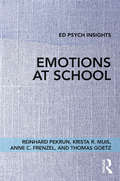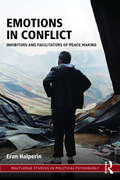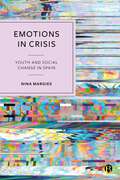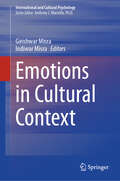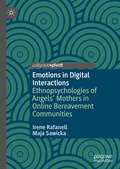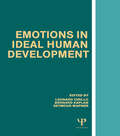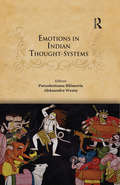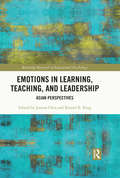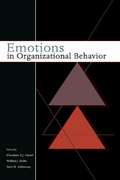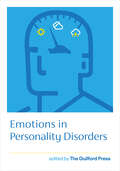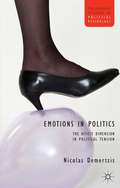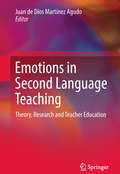- Table View
- List View
Emotions and Anxiety: New Concepts, Methods, and Applications (Psychology Library Editions: Emotion #Vol. 16)
by Marvin Zuckerman Charles D. SpielbergerFirst published in 1976, this volume was completely new with original contributions and traces the advances in theory and research on anxiety and emotion of the previous decade. The authors examine the origins of fear, anxiety, and other emotions and consider self-report and psychophysiological approaches to the measurement of anxiety. Also considered are the effects of anxiety on the behaviour of normal and abnormal subjects, and the volume concludes with behavioural approaches to assessment and treatment of anxiety in clinical settings.
Emotions and Mass Atrocity: Philosophical and Theoretical Explorations
by Thomas Brudholm Johannes LangThe study of genocide and mass atrocity abounds with references to emotions: fear, anger, horror, shame and hatred. Yet we don't understand enough about how 'ordinary' emotions behave in such extreme contexts. Emotions are not merely subjective and interpersonal phenomena; they are also powerful social and political forces, deeply involved in the history of mass violence. Drawing on recent insights from philosophy, psychology, history, and the social sciences, this volume examines the emotions of perpetrators, victims, and bystanders. Editors Thomas Brudholm and Johannes Lang have brought together an interdisciplinary group of prominent scholars to provide an in-depth analysis of the nature, value, and role of emotions as they relate to the causes and dynamics of mass atrocities. The result is a new perspective on the social, political, and moral dimensions of emotions in the history of collective violence and its aftermath.
Emotions and Social Change: Historical and Sociological Perspectives (Routledge Studies in Social and Political Thought #89)
by David Lemmings Ann BrooksThis edited collection takes a critical perspective on Norbert Elias’s theory of the "civilizing process," through historical essays and contemporary analysis from sociologists and cultural theorists. It focuses on changes in emotional regimes or styles and considers the intersection of emotions and social change, historically and contemporaneously. The book is set in the context of increasing interest among humanities and social science scholars in reconsidering the significance of emotion and affect in society, and the development of empirical research and theorizing around these subjects. Some have labeled this interest as an "affective turn" or a "turn to affect," which suggests a profound and wide-ranging reshaping of disciplines. Building upon complex theoretical models of emotions and social change, the chapters exemplify this shift in analysis of emotions and affect, and suggest different approaches to investigation which may help to shape the direction of sociological and historical thinking and research.
Emotions and Social Relations
by Ian Burkitt"A thoughtful, scholarly yet accessible account of emotion that speaks to current debates associated with the 'affective turn' in disciplines including sociology, cultural studies, geography and psychology... invaluable for anyone wanting to understand contemporary engagements with affect, emotion and feeling." - John Cromby, Loughborough University "This is a lucid, engaging, and thoroughly insightful review of current social scientific thinking on emotions in social life by a leading scholar in the field. Burkitt advances a radically relational conceptualisation of emotion - one which has far-reaching implications for current debates surrounding this topic. The book is sure to become essential reading for both students and researchers interested in emotion" - Jason Hughes, University of Leicester "A masterful exposition of the links between emotions and social relations. Ian Burkitt develops a powerful theory of emotions as arising in patterns of relationships. Extending the pragmatist approach of James and Dewey, Burkitt argues convincingly that emotions can be reduced to neither neurophysiological processes nor discursive practices, but are complexes of the physical, social and discursive realms as these are experienced by living human bodies in relationships. Empirically rich and theoretically deep, this is a highly readable book. - Svend Brinkmann, University of Aalborg This book is a compelling and timely addition to the study of emotions, arguing that emotion is a response to the way in which people are embedded in patterns of relationship, both to others and to significant social and political events or situations. Going beyond the traditional discursive understanding of emotions, Burkitt investigates emotions as a complex and dynamic phenomenon that includes the whole self, body and mind, but which always occur in relation to others.
Emotions and the Family
by Richard Fabes Gary W Peterson Suzanne SteinmetzThe family is the place where minds come in contact with one anotherBuddha Emotions and the Family reflects the dramatic change in how professionals and practitioners working with today's families view the role of emotions in general family and marital processes. Professionals, researchers, and academics present a wide variety of approaches to the study of emotion and family functioning, providing a rare theoretical and empirical look at how emotions regulate, guide, and influence actions and behaviors within the family. This unique book will provide you with new avenues of research, theory, measurement, and analysis, emphasizing contexts that range from the focus on specific relationships within the family to the impact of contextual influences in family emotionality. Emotions and the Family examines the shift that has taken place in how practitioners and therapists view emotionsas having important interpsychic functions instead of as a function of intrapsychic processes. The book will show you how emotions are involved in almost every aspect of family development: from the beginnings of the family formation (dating, courting, and marriage) to the transition to parenthood (pregnancy, birth, bonding, and attachment) to the dissolution of family relationships (divorce, death). Authors discuss aspects of how the fabric of family life is woven together by the complex interplay of emotions, with essential information on: marital/family relationships parenting socialization sibling relationships family health dysfunctional family processes family therapy and much more! Emotions and the Family functions as an invaluable textbook for graduate studies in family sciences, child development, psychology, social work, and sociology. The book is equally effective as a professional resource for clinical practitioners in psychology, marriage and family therapy, and social work.
Emotions and the Family: for Better Or for Worse
by Elaine A. BlechmanThis book presents, for the first time, a full range of perspectives on emotions and the family from the radical behaviorist to the intrapsychic. B.F. Skinner begins the volume by examining the role of feelings in applied behavior analysis, thus laying the groundwork for the reactions of many distinguished contributors. Offering both opposing and favorable comments, contributors also present their own original empirical, theoretical, and clinical perspectives. Finally, the editor integrates the contributors' positions into an expanded behavioral perspective on the study of emotions and suggest a model for effective family communication.
Emotions and the Making of Psychiatric Reform in Britain, c. 1770-1820 (Palgrave Studies in the History of Emotions)
by Mark NeuendorfThis book explores the ways which people navigated the emotions provoked by the mad in Britain across the long eighteenth century. Building upon recent advances in the historical study of emotions, it plots the evolution of attitudes towards insanity, and considers how shifting emotional norms influenced the development of a ‘humanitarian’ temperament, which drove the earliest movements for psychiatric reform in England and Scotland. Reacting to a ‘culture of sensibility’, which encouraged tears at the sight of tender suffering, early asylum reformers chose instead to express their humanity through unflinching resolve, charging into madhouses to contemplate scenes of misery usually hidden from public view, and confronting the authorities that enabled neglect to flourish. This intervention required careful emotional management, which is documented comprehensively here for the first time. Drawing upon a wide array of medical and literary sources, this book provides invaluable insights into pre-modern attitudes towards insanity.
Emotions and the Right Side of the Brain
by Guido GainottiThis book focuses on asymmetries in brain structure and their role in emotional functions (such as amygdala in emotional comprehension, the ventro-medial prefrontal cortex in the integration between cognition and emotion and in the control of emotional reactions, and the anterior insula in the experience of emotions). The idea of hemispheric asymmetries in emotional comprehension and expression was first proposed about a century after the first studies showing that the left hemisphere is dominant for language, but it quickly became very popular. Initial investigations considered the right and left hemispheres as single functional units, but in the last few years several researchers have focused attention on asymmetries in brain structures playing a critical role in specific components of emotional functions. Furthermore, interesting data have been obtained by studying emotional and behavioural disorders of patients with asymmetrical forms of frontal or temporal variants of fronto-temporal degeneration. Elaborating on these subjects requires, on the one hand, a consolidated understanding of how models concerning the relationships between emotions and hemispheric asymmetries evolved in time and, on the other hand, a sound interdisciplinary knowledge of psychology (nature, components and hierarchical organization of emotions) and neuroscience (neuroanatomy). This volume – intended for neurologists, neuroscientists and psychologists – pursues an organic and consistent approach to provide an overview of these complex and fascinating issues.
Emotions and the Therapist: A Systemic-Dialogical Approach (The Systemic Thinking and Practice Series)
by Paolo BertrandoIn recent years, systemic theory and practice adopted a dialogical orientation, centred on the persons of the therapist and client. This has led to a growing attention toward emotions, which, in this book, is developed in terms of emotional systems. An emotional system in therapy may be viewed as the sum of the emotions existing and interacting in people's lives. Relevant changes in life happen when emotional stances and sequences change within the system, leading, for example, to a greater sense of agency or hope, or to a different perception of the situation. This book looks at emotions within human systems in terms of dominant and silent emotions, which shape and are shaped by human relationships, and may be played in several ways according to reciprocal emotional positioning. The therapist uses his or her own feeling, and understanding of the emotions within the therapeutic dialogue, in order to create hypotheses and new dialogues which allow change.
Emotions and their influence on our personal, interpersonal and social experiences
by Ami RokachResearch indicates that each emotion is associated with cognitive appraisals that influence our decision-making, our behavior and our relationships. Positive emotions may enhance our point of view and affect our decision to execute what we meant to. Negative emotions are known to not only affect the manner in which we view the world, but our plans, our willingness to interact with others, and our choices, both behaviorally, and cognitively. Emotions are also known to affect us physically. Positive emotions support our immune system, are responsible for our health enhancing behavior, and allow us to be open to our social support network. Negative emotions are known to hamper our immune system and thus make us more prone to illnesses, sometimes life threatening ones, and interfere with successfully coping with them. This book focuses on the role of emotions in everyday life, and particularly, the destructive effects of negative emotions such as anger, anxiety, depression, and the fear of death that humans share. The articles in this book were originally published in the Journal of Psychology: Interdisciplinary and Applied.
Emotions as Bio-cultural Processes
by Hans Jürgen Markowitsch Birgitt Röttger-RösslerEmotions have emerged as a topic of interest across the disciplines, yet studies and findings on emotions tend to fall into two camps: body versus brain, nature versus nurture. Emotions as Bio-cultural Processes offers a unique collaboration across the biological/social divide--from psychology and neuroscience to cultural anthropology and sociology--as 15 noted researchers develop a common language, theoretical basis, and methodology for examining this most sociocognitive aspect of our lives. Starting with our evolutionary past and continuing into our modern world of social classes and norms, these multidisciplinary perspectives reveal the complex interplay of biological, social, cultural, and personal factors at work in emotions, with particular emphasis on the nuances involved in pride and shame. A sampling of the topics: (1) The roles of the brain in emotional processing. (2) Emotional development milestones in childhood. (3) Social feeling rules and the experience of loss. (4) Emotions as commodities? The management of feelings and the self-help industry. (5) Honor and dishonor: societal and gender manifestations of pride and shame. (6) Emotion regulation and youth culture. (7) Pride and shame in the classroom. A volume of such wide and integrative scope as Emotions as Bio-cultural Processes should attract a large cohort of readers on both sides of the debate, among them emotion researchers, social and developmental psychologists, sociologists, social anthropologists, and others who analyze the links between humans that on the one hand differentiate us as individuals but on the other hand tie us to our socio-cultural worlds.
Emotions as Original Existences: A Theory of Emotion, Motivation and the Self
by Demian WhitingThis book defends the much-disputed view that emotions are what Hume referred to as ‘original existences’: feeling states that have no intentional or representational properties of their own. In doing so, the book serves as a valuable counterbalance to the now mainstream view that emotions are representational mental states. Beginning with a defence of a feeling theory of emotion, Whiting opens up a whole new way of thinking about the role and centrality of emotion in our lives, showing how emotion is key to a proper understanding of human motivation and the self. Whiting establishes that emotions as types of bodily feelings serve as the categorical bases for our behavioural dispositions, including those associated with moral thought, virtue, and vice.The book concludes by advancing the idea that emotions make up our intrinsic nature - the characterisation of what we are like in and of ourselves, when considered apart from how we are disposed to behave. The conclusion additionally draws out the implications of the claims made throughout the book in relation to our understanding of mental illness and the treatment of emotional disorders.
Emotions at School (Ed Psych Insights)
by Thomas Goetz Reinhard Pekrun Krista R. Muis Anne C. FrenzelFor more than a decade, there has been growing interest in the role of emotions in academic settings. Written by leading experts on learning and instruction, Emotions at School focuses on the connections between educational research and emotion science, bringing the subject to a wider audience. With chapters on how emotions develop and work, evidence-based recommendations about how to foster adaptive emotions, and clear explanations of key concepts and ideas, this concise volume is designed for any education course that includes emotions in the curriculum. It will be indispensable for student researchers and both pre- and in-service teachers alike.
Emotions in Conflict: Inhibitors and Facilitators of Peace Making (Routledge Studies in Political Psychology)
by Eran HalperinSocial and political psychologists have attempted to reveal the reasons why individuals and societies that acknowledge that peace would improve their personal and collective well-being, and are aware of the required actions needed to promote it, are simply incapable of making this step forward. Some social psychologists have advocated the idea that certain societal beliefs and collective memories about the nature of the opponent, the in-group, the history, and the current state of the conflict distort the perceptions of society members and prevent them from identifying opportunities for peace. But these cognitive barriers capture only part of the picture. Could identifying the role of discrete emotions in conflicts and conflict resolution potentially provide a wide platform for developing pinpoint conflict resolution interventions? Using a vast array of primary sources, critical literature analysis, and firsthand personal experiences in various conflict zones (Middle East, Cyprus, Bosnia, and Northern Ireland), Eran Halperin introduces a new perspective on psychological barriers to peace. Halperin focuses on various emotional mechanisms that hamper peace processes, even when parties face real opportunities for conflict resolution. More specifically, he explores how hatred, anger, fear, angst, hope, despair, empathy, guilt, and shame, combined with various emotion regulation strategies, provide emotions-based explanations for people's attitudinal and behavioral reactions to peace-related events during the ongoing process of conflict resolution. Written in a clear and accessible style, Emotions in Conflict offers a thought-provoking and pioneering insight into the role discrete intergroup emotions play in impeding, as well as facilitating, peace processes in intractable conflicts. This book is essential reading for those who study intractable conflicts and their resolutions, and those who are interested in the ‘real-world’ implication of recent theories and findings on emotion and emotion regulation.
Emotions in Crisis: Youth and Social Change in Spain
by Nina MargiesWe usually speak of crisis in numbers: decline in purchasing power, rise in unemployment rates or decreasing levels of life satisfaction. But what do people feel when their supposed securities for their futures crumble? The stories of the young adults after the 2008 economic crisis in Spain provide us with answers. This book shows how their loss of future prospects led to feelings of uncertainty, anxiety, frustration and resentment, and how they dealt with these emotions. Combining the sociology of emotions with Bourdieu's practice theory, Emotions in Crisis analyses the impact of structural changes in society on individual and collective emotions.
Emotions in Cultural Context (International and Cultural Psychology)
by Girishwar Misra Indiwar MisraThis book approaches emotion from a cultural perspective in applied contexts, consolidating new research that examines the interface of emotions with various aspects of human life. It provides insights into the vibrant and growing field of emotion research by rearticulating the distinction and interrelationships of the trilogy of mind consisting of cognition, affection and conation. It brings into focus indigenous and culturally relevant conceptualizations of emotion processes. Among the topics covered: Emotions at work: applications of emotional intelligenceIndian perspectives on youth, compassion, and moral well-beingParental emotion regulationstrategiesRole of emotions in construction of social identities Emotions in Cultural Context offers an up-to-date exploration of recent work in psychology of emotions.
Emotions in Digital Interactions: Ethnopsychologies of Angels' Mothers in Online Bereavement Communities
by Irene Rafanell Maja SawickaCombining the conceptual tools of interactionist and social constructionist positions, this book presents an in-depth investigation of emotions in digital interactions. Through the central case study of online bereavement communities for women who have suffered perinatal loss, this volume highlights the significance of affective sanctioning as constitutive of group dynamics and practice. The authors chart the emergence of a new ethnopsychology of motherhood—the category of ‘Angels’ Mothers’—arising from the localized practices of a community whose experience of grief is otherwise disenfranchised. Through their detailed theoretical exploration of the centrality of micro-situational dynamics, alongside the rich empirical illustration of collectively shared feeling rules and norms, Rafanell and Sawicka develop a naturalistic approach to the analysis of empirical data, providing insights for policy-making interventions.
Emotions in Ideal Human Development
by Bernard Kaplan Seymour Wapner Leonard CirilloDerived from a conference sponsored by the Heinz Werner Institute for Developmental Analysis at Clark University, these papers consider the role emotions play in ideal human development. Contributors from the fields of psychology, philosophy, and sociology discuss the place that "feelings," "affect," "passion," and "emotion" should ideally occupy in human existence and how realization of this goal can be fostered. The conference organizers focused the discussions by asking the participants to consider six questions, each of which was intended to touch upon some aspect of the relationship between emotions and ideal human development. Chapters contain the papers presented and a summary of the discussions that followed the presentations.
Emotions in Indian Thought-Systems
by Purushottama Bilimoria; Aleksandra WentaA stimulating account of the wide range of approaches towards conceptualising emotions in classical Indian philosophical–religious traditions, such as those of the Upanishads, Vaishnava Tantrism, Bhakti movement, Jainism, Buddhism, Yoga, Shaivism, and aesthetics, this volume analyses the definition and validity of emotions in the construction of
Emotions in International Politics
by Jean-Marc Coicaud Ariffin, Yohan and Coicaud, Jean-Marc and Popovski, Vesselin Yohan Ariffin Vesselin PopovskiIn recent years, social scientists have increasingly recognized the interconnectedness of thought on emotions. Nowhere is the role of passions more evident than international politics, where pride, anger, guilt, fear, empathy, and other feelings are routinely on display. But in the absence of an overarching theory of emotions, how can we understand their role at the international level? Emotions in International Politics fills the need for theoretical tools in the new and rapidly growing subfield of international relations. Eminent scholars from a range of disciplines consider how emotions can be investigated from an international perspective involving collective players, drawing evidence from such emotionally fraught events as the Rwandan genocide, World War II, the 9/11 attacks, and the Iranian nuclear standoff. The path-breaking research collected in Emotions in International Politics will be a valuable theoretical guide to understanding conflict and cooperation in international relations.
Emotions in Learning, Teaching, and Leadership: Asian Perspectives (Routledge Research in Educational Psychology)
by Ronnel B. King Junjun ChenEmotions are at the core of the educational enterprise but their role is mostly left unexamined. This book explores the role of emotions across students, teachers and school leaders. It showcases current theoretical and empirical research on emotions in educational settings conducted in the Asian context. The book consists of three parts, namely, emotions in learning, emotions in teaching and emotions in leadership. These chapters cover different levels from students (e.g., school, university), to teachers (e.g., pre-service, in-service) and to school leaders (e.g., middle-level teachers, principals). Samples are recruited from a wide range of Asian contexts (e.g., Hong Kong SAR, Macau SAR, Mainland China, Singapore and the Philippines). Collectively, the authors use a variety of methods ranging from quantitative to qualitative approaches and demonstrate innovative theoretical work that pushes the boundaries of emotions research forward.
Emotions in Organizational Behavior
by Neal M. Ashkanasy Wilfred J. Zerbe Charmine E.J. HärtelThis edition was conceived and compiled to meet the need for a comprehensive book for practitioners, academics, and students on the research of emotions in organizational behavior. The book is the first of its kind to incorporate organizational behavior and bounded emotionality. The editors' primary aim is to communicate the research presented at the bi-annual International Conference on Emotions and Organizational Life to a wider audience. This edition looks at the range of research on emotions within an organizational behavior framework; organized in terms of the individual, interpersonal, and organizational levels. Particular emphasis has been placed on obtaining the leading research in the international sphere. This book is intended to be useful to the student of organizational behavior, as well as to the managers of organizations.
Emotions in Personality Disorders
by The Guilford PressThis volume presents innovative clinical research programs and findings pertaining to emotions in personality disorders. Originally published in a Special Supplement of the Journal of Personality Disorders, chapters are written by a range of clinical experts. With a primary focus on borderline personality disorder (BPD), the book addresses such topics as personality function and emotional change in psychotherapy; how emotional dysregulation affects beliefs about emotion; shame as a core feature of BPD; the relationship between childhood adversity, affective lability, and alexithymia; and current directions in treatment.
Emotions in Politics: The Affect Dimension in Political Tension
by Nicolas DemertzisPrompted by the 'affective turn' within the entire spectrum of the social sciences, this books brings together the twin disciplines of political psychology and the political sociology of emotions to explore the complex relationship between politics and emotion at both the mass and individual level with special focus on cases of political tension.
Emotions in Second Language Teaching
by Juan de Martínez AgudoThis edited volume explores the multifaceted nature of teacher emotions, presenting current research from different approaches and perspectives, focused towards the second language classroom. Twenty three chapters by well-known scholars from the applied linguistics, TESOL and educational psychology fields provide the reader with a holistic picture of teacher emotions, making this collection a significant contribution to the field of second language teaching. Given the emotional nature of teaching, the book explores a number of key issues or dimensions of L2 teachers’ emotions that were until now rarely considered. The contributions present the views of a select group of applied linguistic researchers and L2 teacher educators from around the world. This international perspective makes the book essential reading for both L2 teachers and teacher educators.
